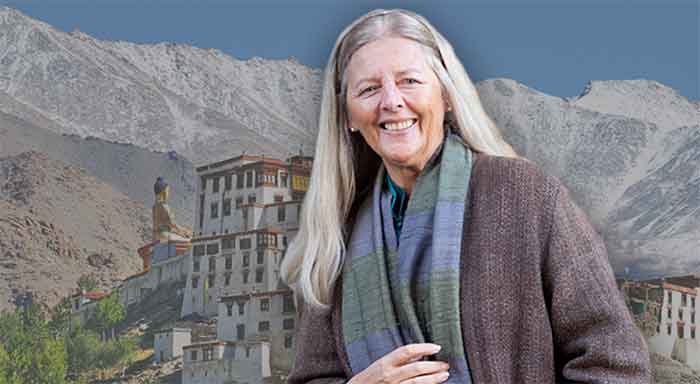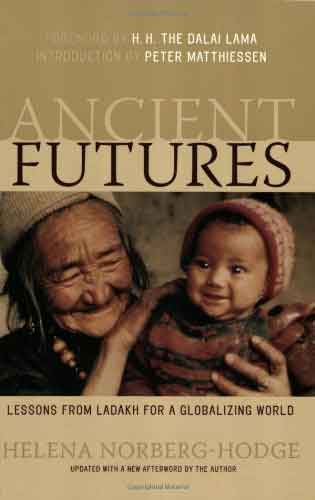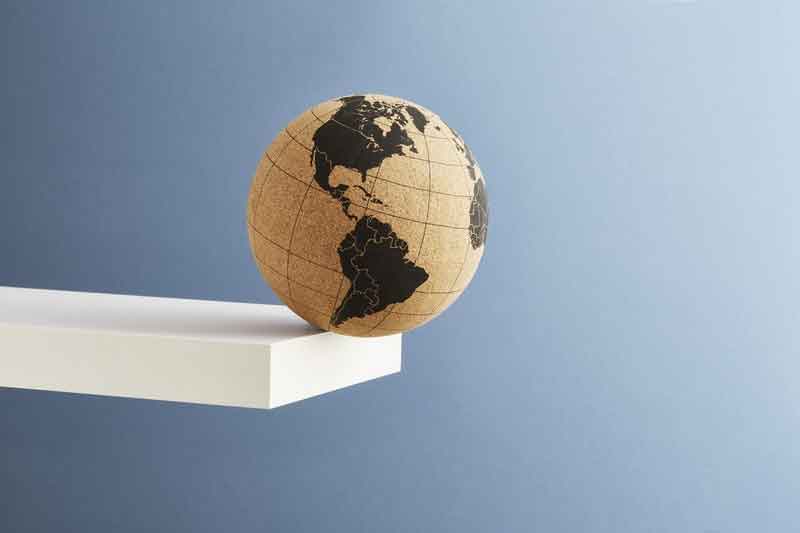by A K Shiburaj/Helena Norberg-Hodge

Helena Norberg Hodge is the founder and director of Local Futures, an organization working to revitalize cultural and biological diversity and empower local communities and economies around the world. Helena’s book ‘Ancient Futures’, which explains the traditions of the people of Ladakh and the changes in their culture, has received international attention. Translated into Malayalam by A Ramamurthy, this book was published by Insight Publica under the title ‘Puratana Bhavikal‘. She is also the author of the book ‘Local is Our Future’. An outspoken critic of economic globalization, Helena founded the International Forum on Globalization (IFG) in 1994. She founded the International Alliance for Localization (IAL) in 2014, advocating localization as a solution to the problems created by globalization. Helena produced and co-directed the documentary film ‘The Economics of Happiness’ (2011) detailing her arguments against economic globalization. She was awarded the Right Livelihood Award in 1986 for her contribution to protecting the traditional cultures and values of Ladakh from the encroachment of tourism and development. She shares her views on localization as a way to tackle the climate crisis and growing inequality across the world.
Your book ‘Ancient Futures’ is one of the most discussed books in the world. This book has recently been translated into Malayalam as ‘Puratana Bhavikal‘. Can you begin by talking about the responses you got from the readers and critics of this book from different parts of the world?
I got various responses from different parts of the world,especially from those who have experienced life in the West. They have realized that the Western model is collapsing and that, it is the road to total destruction. Therefore, they are aware of the need to develop an alternative culture, economy and lifestyle. I think this book was conceived as part of a search for new order of life. The book gives readers a glimpse of how ‘development’ has destroyed the people of Ladakh who were living in self-sufficiency, peace and happiness. I have seen firsthand how ‘development’ impoverishes them in every sense.
Having completed your education and lived in different countries, can you tell us how you came to Ladakh where you got to live in close contact with the local people for a long time?
 As a linguist, I have studied and lived in various countries such as America and Sweden. My main interest was in psychology and art. I was very interested in learning new languages as well. When I was in Paris, I got an opportunity to go to the place called Ladakh in India. It was to help in the production of a film. The main purpose was to help the producers linguistically. As part of that, I fell in love with Ladakh as soon as I got to know the people living as part of a very peaceful and rich culture. Later I stayed there and tried to get to know more about their lives. What I saw there was a paradise of well-being and happiness on earth. A healthy population lived happily and self-sufficiently. But by the end of almost twenty years, the changes brought by ‘development’ had devastated Ladakh. Today, dusty atmosphere, polluted water sources and concrete buildings can be seen everywhere. The changed economic order brought unemployment and competition there. I have written about these changes in detail in Ancient Futures.
As a linguist, I have studied and lived in various countries such as America and Sweden. My main interest was in psychology and art. I was very interested in learning new languages as well. When I was in Paris, I got an opportunity to go to the place called Ladakh in India. It was to help in the production of a film. The main purpose was to help the producers linguistically. As part of that, I fell in love with Ladakh as soon as I got to know the people living as part of a very peaceful and rich culture. Later I stayed there and tried to get to know more about their lives. What I saw there was a paradise of well-being and happiness on earth. A healthy population lived happily and self-sufficiently. But by the end of almost twenty years, the changes brought by ‘development’ had devastated Ladakh. Today, dusty atmosphere, polluted water sources and concrete buildings can be seen everywhere. The changed economic order brought unemployment and competition there. I have written about these changes in detail in Ancient Futures.
You are someone who understands the various challenges humanity face today and works to overcome them and create a better world. You clearly state that the existing economy is the main cause of our crisis. A radical change in the economy is one thing that many progressive movements working for social justice and environmental protection are not asking for. Why is the economy the root cause of crises?
I learned about the effects of colonialism on many indigenous cultures across the world. Unemployment, poverty, suicide, depression etc. became part of people who were living in good health as an impact of the colonial rule. Many tribal communities with different culture and life values have been living in harmony for ages. Centralized, top-down colonial methods based on exploitation have led the world to decadence in many ways. The modern economy may look progressive from outside, but in essence it is a destructive project. But the constant propaganda that economic growth and development projects are advancing life was deliberately imposed on people’s minds. Western culture has succeeded in creating a sense of inferiority in the minds of the indigenous people by propagandizing that the lives they lead are bad. Therefore, it should be assumed that many people did not get a chance to critically look at the existing economy. But the invisible hands of the ubiquitous economic system have been wreaking havoc on every aspect of our lives. This can only be realized if one tries to understand the system independently of the futile promises that the market makes. But the reality is that the mainstream universities and media are not dealing with that knowledge. But these things have been written and spoken by many in the world. Don’t you remember what Albert Howard said when he came to India from England to teach farmers new farming methods? That he should not teach them, instead England should learn from the Indians was his finding. He could find people in India who understood the soil and learned the basic lessons of health and they also applied different sustainable methods to maintain the health of the soil. European culture ‘developed’ as we see it today could achieve the status by plundering the wealth of these people and enslaving them.
As part of your long-term social work through direct interaction with different cultures, you learned that the ‘development’ brought about by economic globalization is unrealistic and a destructive project. So you started saying that revitalization of the local economy is very important. Can you talk about the importance of the local economy and how it can help maintain cultural diversity?
 Today many parts of the world are trying to build an economy based on their control and cultural values using local resources. They are actions to defend the new global economy, which continues in a different way of exploitation introduced by colonialism in the 1700s. Local economy is an activity in which a community fulfills the needs of food, clothing and shelter etc. using resources available in each region. Instead of relying on global traders, they consider Nature as integral part of life and use its resources judiciously.This system promotes diversity and considers sustainability rather than accumulation of wealth pursuing monoculture. This is in contrast to a system where those who work longer hours become poorer and the other minority become billionaires. Building a local economy is an effort by ordinary people to stop serving the wealthy and live healthier lives. They place critical importance on food production which is one of the most basic needs. They recognize that local economies are strengthened when they produce a variety of agricultural products through polyculture. It also provides job opportunities to more people, thus it becomes a more enjoyable and meaningful way of life. It is the alternative to working for someone as an economic slave in some unnatural monoculture system. And local food production is a very effective intervention to understand the difference between the global market and the local market. Here, there is no need to use toxic chemicals that are harmful to the soil and humans to make more profit. It also maintains biological diversity and helps restore the lost balance of nature. It is also a holistic way of looking at things.
Today many parts of the world are trying to build an economy based on their control and cultural values using local resources. They are actions to defend the new global economy, which continues in a different way of exploitation introduced by colonialism in the 1700s. Local economy is an activity in which a community fulfills the needs of food, clothing and shelter etc. using resources available in each region. Instead of relying on global traders, they consider Nature as integral part of life and use its resources judiciously.This system promotes diversity and considers sustainability rather than accumulation of wealth pursuing monoculture. This is in contrast to a system where those who work longer hours become poorer and the other minority become billionaires. Building a local economy is an effort by ordinary people to stop serving the wealthy and live healthier lives. They place critical importance on food production which is one of the most basic needs. They recognize that local economies are strengthened when they produce a variety of agricultural products through polyculture. It also provides job opportunities to more people, thus it becomes a more enjoyable and meaningful way of life. It is the alternative to working for someone as an economic slave in some unnatural monoculture system. And local food production is a very effective intervention to understand the difference between the global market and the local market. Here, there is no need to use toxic chemicals that are harmful to the soil and humans to make more profit. It also maintains biological diversity and helps restore the lost balance of nature. It is also a holistic way of looking at things.
Many organized activities are taking place in different parts of the world trying to change the existing system. One of the important aspect of your work is ideas based on Economy of Happiness. Could you tell us about it? Is this something that has been evolved from your experience in Ladakh?
I could quickly learn the language of Ladakh. It gave me an opportunity to interact with people enjoying good health and finest minds those days. It was the first time I saw people with such self-respect, tolerance and sense of humor. Every person of the community was the protector of every child. Raising children was a common responsibility. This experience helped me to understand the shades of meanings of human relationship beyond the kinship between parents and children. They understood the fact that every child wants to be loved and accepted unconditionally. All these were new experiences for me. Every child deserves lots of love, consideration and recognition as a unique individual. I have come to understand these as the main reasons of happiness and contentment. When I arrived in Sweden, I realized how different life was and how isolated each person was, being disconnected from community life. In many other countries, I have seen high rates of depression and alcoholism, but the real causes are never investigated. The prevailing system in the world is one that promotes individualization and competition. It is in this context that I began to think about the Economy of Happiness. It is one that emphasizes intergenerational relationships and the transfer of knowledge.
Our competitive education system is a part of this violent global economy. It is high time we seriously investigated about how it teaches our children to live in isolation and mutual exploitation. Education is taking children away from being normal human beings by teaching them that everyone should be so perfect, beautiful, and rich. You must always be a winner, or you will end up as a burnt out case. On the other hand the local economy believes in mutual cooperation and interdependence. Instead of everyone being perfect, it gives each person a chance to participate in social life according to their ability and interest. It accepts diversity as an essential ingredient of life. Likewise, the widespread unemployment we see today is created as part of these economic policies. It exists because of deliberately manufactured scarcity in the world. Poverty does not occur naturally. The reality is that a good percentage of people working in corporate companies are unhappy. The Economy of Happiness provides an opportunity to exchange basic human needs such as love, respect and recognition. It is not something that negates the very existence of man and nature by producing goods for the market.
It is seen that even eminent economists do not say that fundamental changes are needed in the existing economy. While Amartyasen and others talk about social justice and welfare and against growing inequality, they do not say that the growth-based economy must change or that it cannot continue to use natural resources infinitely. Moreover, governments do not take ecological economists seriously who talk about ecological sustainability and systemic change. Why is this happening?
Modern economic system survives by displacing people from their habitat and committing genocide. That is how it strives to achieve continuous growth. In Europe, people displaced from their own land are employed in factories for small wages. After the Second World War, the policies implemented by the rich countries for their economic benefits are the model of the economy seen in the world today. Its aim is to continue exploitation in new ways through economic colonization even after the colonized countries became politically independent. Institutions such as World Bank, IMF and GATT were formed as a part of this. Its proponents propagated the necessity of implementing new economic programs worldwide to avoid a third world war and economic depression, hiding the real objective. They used beautiful words like ‘Integrate’, ‘Harmonize’, etc. to describe this process. Many key figures believed that its aims were of good intention, thus they remained fundamentally uncritical of the new economic policies. On the other hand were communist governments, with centralized power structures, massive military power, resource exploitation and repression. Other than these two regimes, there was no models prevailing in the world. Countries such as Sweden have regimes adopting some aspects of socialism. None of these considered the importance of local economies, the need for biodiversity or environmental sustainability. These ideologies do not even consider that natural capital is part of the economy. Its proponents propagated the myth that technology would create wealth and thereby employment will increase. The paradigm of judicious use of local resources and the use of non-destructive technologies to meet the needs of indigenous peoples has been deliberately ignored. It then, encouraged the concentration of wealth in the hands of a minority. Moreover, it also created a general awareness that the development of technology is inevitable. Those who demand the distribution of such accumulated wealth, do not consider that its source is Nature and its resources are finite.
All centers of knowledge have been colonized. Science and technology institutions, media and research institutions are all under the control of large funding agencies. We ourselves have to find new ways to move away from this mainstream trend and explore the possibility of another world. It needs to be shouted out loud how ridiculous it is that wealth accumulates in the hands of a few. There is a section of people that argues that a world order based on algorithms controlled by robots is more democratic and just. They argue that robots and the internet can create a freer world with more responsibility than humans.
The new IPCC report says that the existence of life on Earth is at a critical juncture and it is difficult to carry on with life as usual. That’s where the relevance of Economy of Happiness comes into play. Many countries are reluctant to take a critical look at the growth-based economic system they are currently pursuing, even as they take many measures to tackle the climate crisis. Isn’t this a big limitation? Isn’t the reality that ‘degrowth’ is not acceptable to any government? Is there any possibility that the Nation States would implement the Economy of Happiness you are talking about?
The majority of people in most countries of the world are barely able to meet their basic needs. It is not appropriate to talk to them about degrowth. It creates the impression of hindering the progress of life ahead of them. Instead, talk to them about empowering the local economy. This will create a strong popular movement for change and feeling of hope in their minds. What is needed on a long-term basis is to build an economy that takes into account the environmental realities. It requires developing models that work in small communities. These role models should be an inspiration to others. Thus, global people’s movements that question the current economic globalization and bring alternatives to the exciting predatory economy must emerge. Various movements for the new economy have emerged in many parts of the world under the names of commons, degrowth and doughnut economy. The global supply chain has been badly affected by Covid, Ukraine war, climate crisis etc. This has created a favorable environment for the local economy to grow. Every society needs to be able to protect its interests from a world controlled by big money and algorithms. Writers, university professors, environmentalists, farmers and people from all walks of life have begun to recognize that the mainstream economy is anti-life. Local economies are steadily emerging to challenge the global economy. It will soon become part of resistance from the grassroots demanding policy change and only then the governments are likely to take it up.
That’s right. But the existing system is a very powerful one. So, if only small communities, individuals and movements stand on the path of change,do you think fundamental changes are possible? Isn’t it more practical for the governments to initiate change in view of multiple crisis?
In the industrialized West, racist tendencies and anti-nature activities have been gaining strength since the Victorian era. But now there is a way of respecting the values of the tribal people and the cultures that live in harmony with Nature. This can be leveraged to bring about policy changes at the local level. In some places, local governments have begun to bring about changes by embracing the values of sustainability. Discussions about the new world have to take place directly among people in different places at local levels. Articles, videos, etc. promoting innovative ideas should also be disseminated through media such as local publications, radio and internet. Governments will only attempt to bring about change if there is pressure from the people. Governments are now driven by interference and pressure from large corporations. Corporations run like big machines. What we need now is the intervention of ordinary human beings of flesh and blood. Only that can highlight the important life value of diversity. What matters is healthy interdependence among humans and between humans and Nature.
Profit-oriented business and interest-based banking systems are key elements of global trade. When thinking about the new economic system, isn’t it important to develop an economic system that excludes profit and interest? Shouldn’t this also be considered when implementing the Economy of Happiness?
The present economy exists by artificially creating poverty and scarcity but the local economic system is not like that. Prosperity is brought about when the food needs of a region is produced locally. Because the financial transactions from it will be under the control of the people of that area. What is happening now is production for the market forces. These are monoculture system that destroy soil and habitats. The same method is followed for production in other sectors too. The production that takes place now is purely profit-oriented and has no regard for Nature or human well-being. What we need is a system of production that takes into account the needs of a society, environmental constraints and possibilities as well. This is ignored when economic growth becomes the main objective and the system do not even care about saving anything for tomorrow’s world. The Economy of Happiness emphasizes environmental sustainability and human well-being and it fosters diversity as the key principle.
A K Shiburaj is an independent journalist
Originally published in Keraleeyam















































